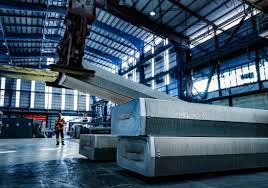On Thursday, a senior European Union official toured a key metals facility in central Greece following the bloc’s announcement of ambitions to lessen its reliance on China and boost production of its vital minerals.
Executive vice president of the European Commission Stéphane Séjourné visited an aluminum facility that would soon produce gallium, a silvery, melt-in-your-hand metal used in military radar systems, 5G antennas, solar panels, and advanced semiconductors.
As demand for high-tech resources rises and geopolitical tensions increase, Séjourné launched dozens of projects this week, including the Greek partnership, to increase the 27-nation bloc’s self-sufficiency in crucial minerals.
Following the tour in Greece, Séjourné posted on the internet,
“This site is one of the 47 strategic projects selected to increase our production of critical raw materials and reduce our dependence on third countries.”
European officials claim that the COVID-19 pandemic, the conflict in Ukraine, and more recently, trade disputes—such as China’s export restrictions on high-tech materials last year—have revealed vulnerabilities in global supply chains.
Laptops 1000The only project of its sort on the list, Greece’s gallium project will combine extraction with the nation’s current aluminum infrastructure and draw from indigenous bauxite supplies.
According to EU and Greek officials, the facility, run by Greece’s Metlen Energy & Metals firm, is anticipated to generate up to 50 metric tons per year once it is operational, beginning in 2027.
This amount would be sufficient to supply the majority of Europe’s anticipated demand.
According to Development Minister Takis Theodorikakos,
“This is a significant investment of strategic importance — directly linked to the autonomy and security of both Greece and the entire European continent.”
A total of 22.5 billion euros ($24.2 billion) will be invested by the EU in mining and processing plans for 17 essential minerals in 13 EU member states.
The minerals are essential components of high-tech goods like medical equipment, battery components, electric cars, and lightweight alloys for transportation.
Séjourné expressed his desire to increase public support for local mining at a presentation of the projects earlier this week in Brussels.
“We do not want to replace our reliance on fossil fuels with a reliance on critical raw materials,” he stated unambiguously.
“Chinese lithium shouldn’t be the next Russian gas.”
The EU nations hosting the strategic projects are France, Germany, Greece, Italy, Poland, Portugal, Romania, Spain, Sweden, Belgium, the Czech Republic, Estonia, and Finland.
The materials discussed include aluminum, boron, cobalt, copper, gallium, germanium, graphite, lithium, magnesium, manganese, nickel, platinum group metals, rare earth elements, and tungsten.

















